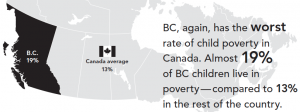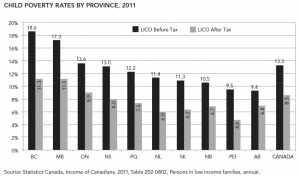Representative for Children and Youth, News Release, October 9, 2014– The provincial government must step up its commitment to helping British Columbia’s most vulnerable children and youth by following through on recommendations, Representative Mary Ellen Turpel-Lafond said today as she released her Office’s latest report.
Not Fully Invested: A Follow-up Report on the Representative’s Past Recommendations to Help Vulnerable Children in B.C. shows that while 72 per cent of the Office’s recommendations between 2008 and 2013 have been acted upon, a number of the most important ones have been ignored. Those unfulfilled include key recommendations made by the Representative to the B.C. government as a whole to improve the lives of Aboriginal children, those living in situations of poverty and domestic violence and those in need of mental health services.
“It’s very disappointing, because these recommendations are the ones that require the greatest leadership and commitment from the provincial government and they have been largely ignored,” Turpel-Lafond said. “Considering that the well-being of our most vulnerable children and youth is at stake, I expect more from government and I think most British Columbians do as well.”
The Representative’s Office, an independent expert oversight body, made a total of 148 recommendations during the course of releasing 22 reports between 2008 and 2013. This report, the first to track progress made toward fulfilling cumulative recommendations made by the Office, shows that 72 per cent of the total recommendations have been substantially or fully implemented. Generally, recommendations made to public bodies – predominantly to the Ministry of Children and Family Development (MCFD) – to address policy, standards, procedures and compliance, have been implemented.
However, of the nine recommendations made to the B.C. government as a whole – the ones requiring the greatest cross-ministry involvement and organization – seven have been largely disregarded. Among these is a call for a provincial strategy and action plan to address child poverty, a call to establish a Minister of State for Mental Health to provide the necessary leadership and accountability on this file, a call for a strong and well-resourced provincial domestic violence plan and the establishment of domestic violence courts in B.C., and a call for a viable strategy to ensure that Aboriginal children and families receive equal supports and services to their non-Aboriginal counterparts.
Many of the Representative’s recommendations have focused on strengthening quality assurance and outcomes reporting by MCFD. However, this report also finds that MCFD’s ability to measure its own performance and publicly report on whether it is achieving results has remained inconsistent and inadequate – yet another sign of a gap in government leadership in this area.
The Representative notes that during the time period these recommendations were made, MCFD’s annual budget was reduced by $100 million in real dollars when inflation is taken into account. Sufficient investment in children and families is important in both a financial and a leadership sense.
“We do not make these recommendations lightly. Each of our reports requires months and sometimes years of research, file reviews, data analysis, interviews with workers in the field and interviews with family members and young people,” Turpel-Lafond said. “While the government is not compelled by legislation to follow our recommendations, to do so shows commitment and makes good sense.
“It is clear that the Province does not yet have a plan that focuses on children across government, nor any comprehensive, focused and accountable approach to ensure that the next generation will be able to reach their full potential. Considering what is at stake, government can and should do better.”

 Follow
Follow

